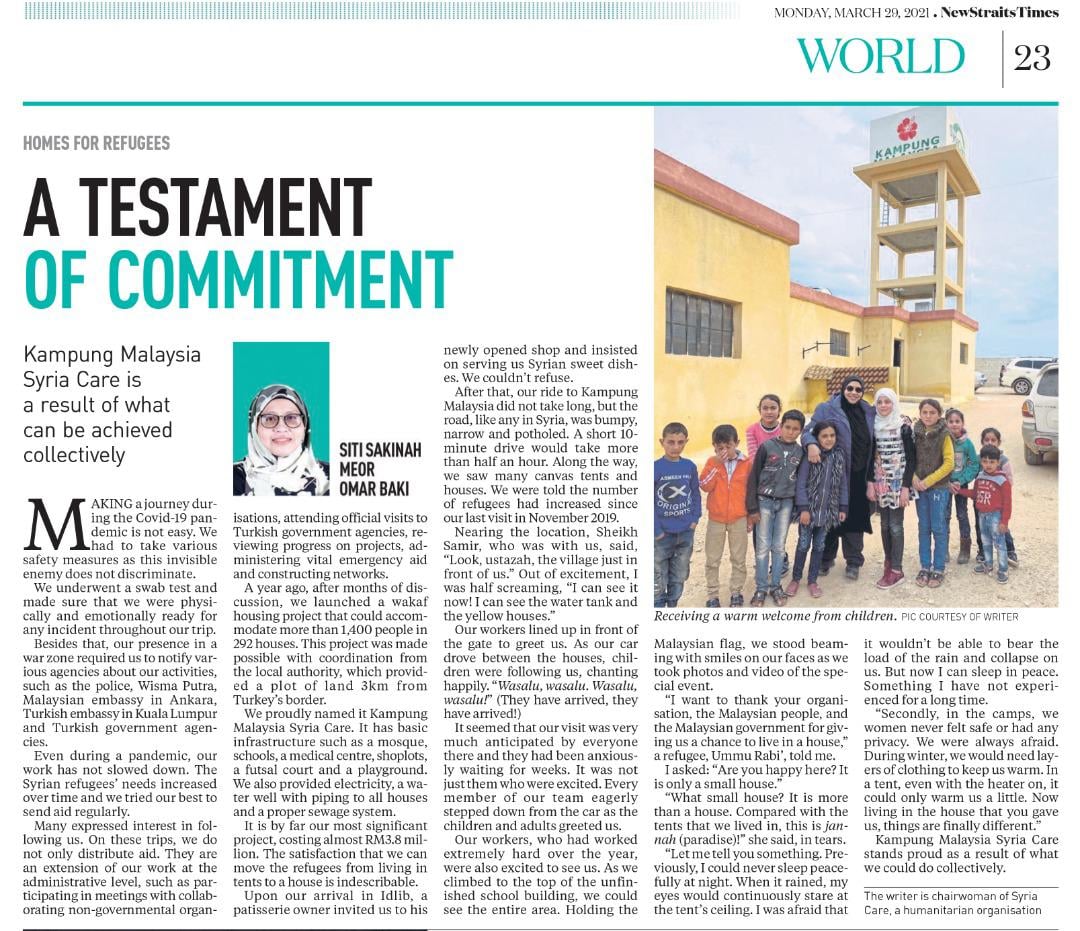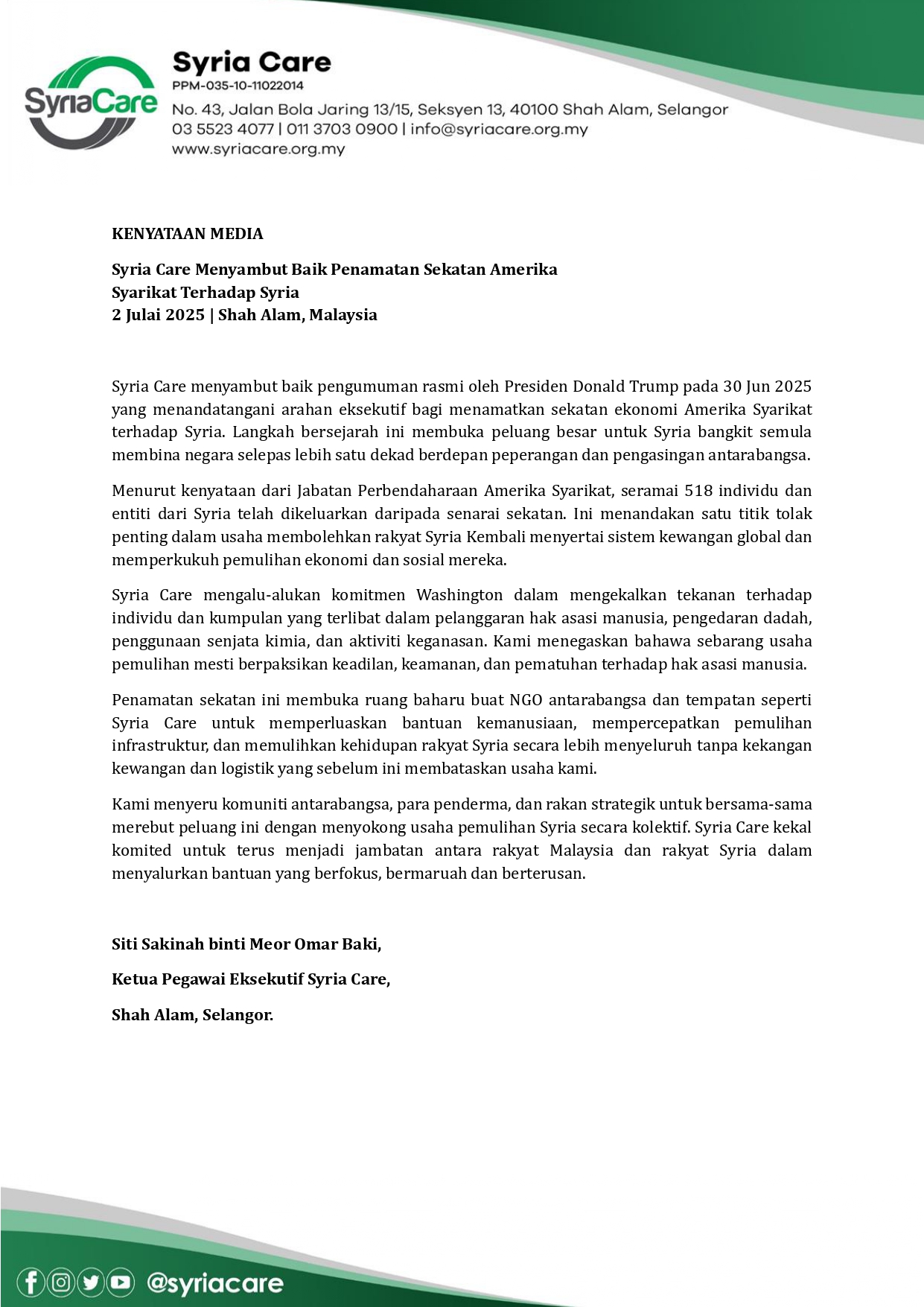Making a journey while the Covid-19 outbreak is still a threat to the world is not easy.
We had to take various preventive measures because this invisible enemy does not discriminate against its victims. Anyone can be at risk of being infected regardless of age or race. As a requirement, we had to undergo a swab test and made sure that we were physically and emotionally ready for any incidents throughout our trip.
Expect the unexpected. That is what I always remind myself and my team of. Everything might be precisely the opposite of what we plan, and we have to face everything with an open heart and mind.
Besides that, our presence in a war zone required us to inform various government agencies such as PDRM, Wisma Putra, Malaysian Embassy in Ankara, Turkey, Turkish Embassy in Kuala Lumpur, and Turkish government agencies.
I must admit that I was somewhat relieved to return to performing fieldwork after a year of confinement. Although this pandemic has hit the whole world and many people are affected, our work has never slowed down. The Syrian refugees’ needs increased over time, and we try our best to send aid regularly.
Many have expressed their interest in following us. What many fail to realize is our trips or missions, as we call them, are work-related. On these trips, we do not only distribute aid as many would imagine. They are an extension of our work on administrative-level, participating in meetings with our collaborating NGOs, attending official visits to respective Turkish government agencies, reviewing progress on current projects, administering vital emergency aid, and constructing networks.
A year ago, after months of discussion, we launched a waqf housing project that could accommodate over 1,400 people in 292 houses. This housing project was possible with coordination from the local authority, which provided us a land only 3km away from Turkey’s border.
We proudly named it ‘Kampung Malaysia Syria Care and built it complete with various basic infrastructures such as a mosque, schools, a medical center, shop lots, a futsal court, and a playground for children to play on. We also provide electricity, a water well with piping to all houses plus a proper sewage system.
Once we received confirmation of approval to enter Syria, we began to make preparations. I have been inside Syria many times before, but the excitement to visit this particular project was different. It is by far our most significant project, costing almost RM3.8 million. The satisfaction that we can move the refugees from living in tents to a house is indescribable.
Upon arrival in Idlib, a local patisseries owner invited us to his newly opened shop, and he insisted on serving us authentic Syrian sweet dishes. We couldn’t refuse. After pumping ourselves with sugar that could last us a month, we excused ourselves.
Our ride to Kampung Malaysia did not take long, but the road, like any road in Syria, is bumpy, narrow with potholes. A short 10 minutes drive would take more than half an hour. Along the way, we saw many tents from canvas and houses. We were told the number of refugees increased since our last visit in November 2019, and the matter was obvious.
As I was gazing through the car window, Sheikh Samir, who was in the car with us, said, “Look, Ustazah, the village just in front of us.” Out of excitement, while recording the moment, I was half screaming, “I can see it now! I can see the water tank and the yellow houses,” It was true our housing project has become a landmark for those in the surrounding area. My eyes became teary.
Our workers lined up in front of the gate to greet us. It was indeed a joyous moment. As our car drove between the houses, children were following us, chanting happily. “Wasalu,wasalu. Wasalu, wasalu!” Which meant, “They have arrived, they have arrived!”
It seemed that our visit was very much anticipated by everyone there, and they had been anxiously waiting for weeks. And it was not just them that were excited. Every member of our team eagerly stepped down from the car as the children and adults greeted us.
Our workers, who had worked extremely hard over the year, we’re also excited to meet us. As we climbed to the top of the unfinished school building, we could see a birds-eye view of the entire area. Holding the Malaysia flag, we stood beaming with smiles on our faces while taking photos and videos to record the special event.
“I want to thank your organization, the Malaysian people, and the Malaysian government for giving us a chance to live in a house,” Ummu Rabi’ came up and told me.
“Are you happy here? I asked her. “It is is only a small house.”
“What small house? It is more than a house. Compared to the tents that we lived in, this is Jannah (Paradise)!” she continued saying with tears of joy in her eyes.
“Let me tell you something…” Ummu Rabi’ came closer to me to share her feelings. “Previously, I could never sleep peacefully at night. When it rained, my eyes will continuously stare at the tent’s ceiling. I was afraid that it wouldn’t be able to bear the load of the rain and collapse on us. But now I can sleep in peace. Something I have not experienced for a long time.”
“And secondly,” Ummu Rabi’ continued, “In the camps, we women never felt safe or had any privacy. Fulfilling the call of nature was not something. We were always afraid. During winter, we would need layers of clothing to keep us warm. In a tent, even with the heater on, it can only warm us a little. Now living in the house you gave us, things are finally different” Ummu Rabi’ expressed her gratitude with tears in her eyes.
Eleanor Roosevelt once said, “Since you get more joy out of giving joy to others, you should put a good deal of thought into the happiness that you can give.”
Kampung Malaysia Syria Care stands proud as a result of what we could do collectively.
Siti Sakinah Meor Omar Baki
CEO of Syria Care




![Kenyataan Media Syria Menuju Masa Depan Lebih Stabil Dengan Gabungan Sdf & Kerajaan Baru[1] Page 0001](https://syriacare.org.my/wp-content/uploads/2025/03/KENYATAAN-MEDIA-SYRIA-MENUJU-MASA-DEPAN-LEBIH-STABIL-DENGAN-GABUNGAN-SDF-KERAJAAN-BARU1_page-0001-scaled.jpg)